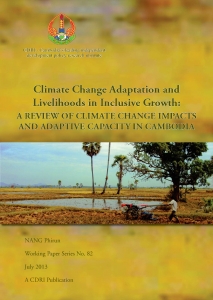Climate Change Adaptation and Livelihoods in Inclusive Growth: A Review of Climate Change Impacts and Adaptive Capacity in Cambodia
This review outlines existing knowledge (context-specific and localized) of climate change impacts, vulnerability, and adaptation, assesses the limitations of different frameworks and approaches used by various initiatives in Cambodia, and identifies knowledge gaps for future research. It explores the impacts of climate change on livelihoods through three dimensions: (1) agricultural practices, technology, policy, irrigation, credit and markets; (2) community-based natural resources management and the roles of forest, fishery and water-user communities in protecting and managing resources; and (3) gender considerations. Analysis draws on existing literature on climate change impacts and adaptation, natural resources management, agricultural and livelihood development, and governance mechanisms, especially as they relate to climate change adaptation as an opportunity to promote inclusive growth.
Majority of rural Cambodians rely on natural resources – mainly water, fisheries, forests and land – and agriculture for their livelihoods. Inadequate irrigation systems supply insufficient water leaving majority of men and women farmers dependent on rainfall distribution, which is vulnerable to climatic variability. Aware of the threat that climate change poses to food and water security and recognizing that future agricultural development depends on effective land and water management, the Royal Government of Cambodia has committed to increasing rice production and to adopting the principles of integrated water resource management.














